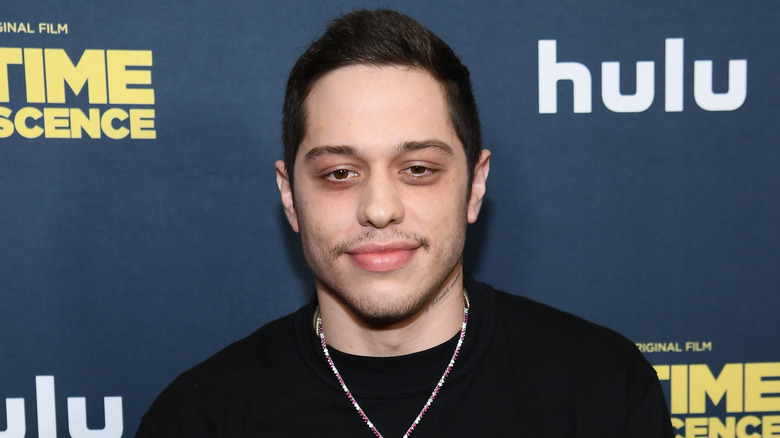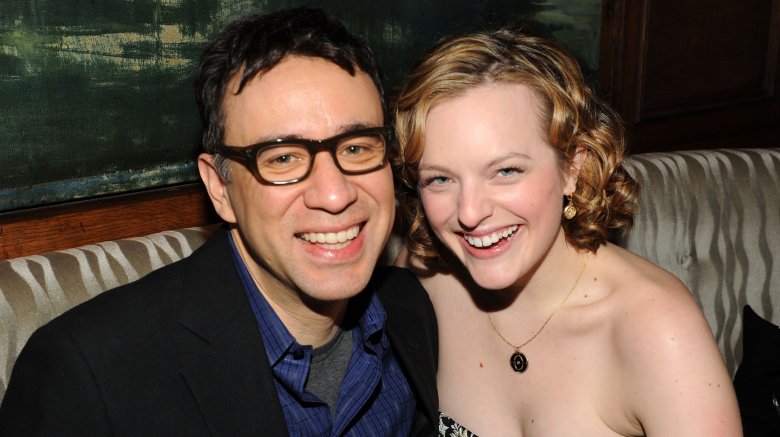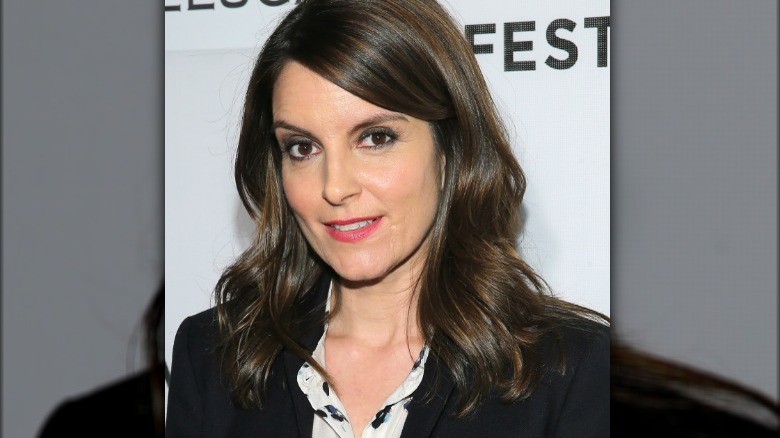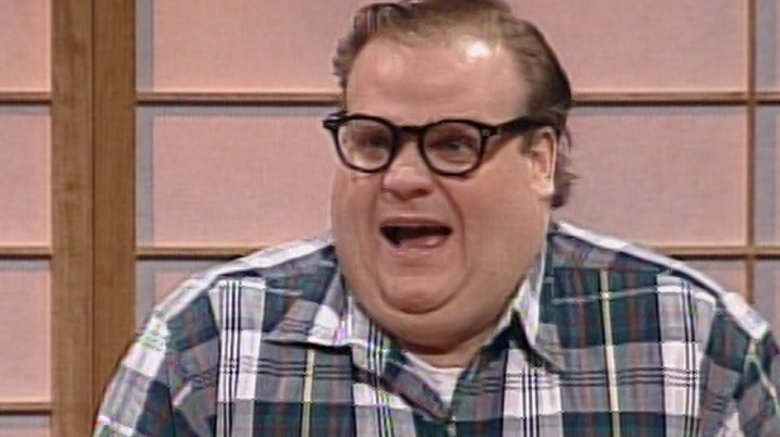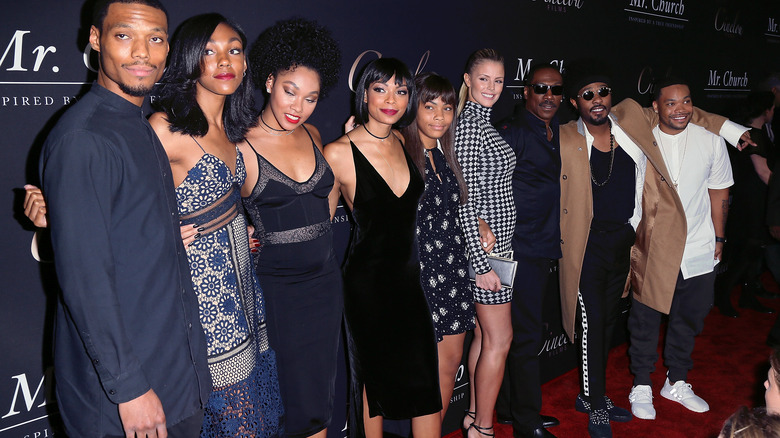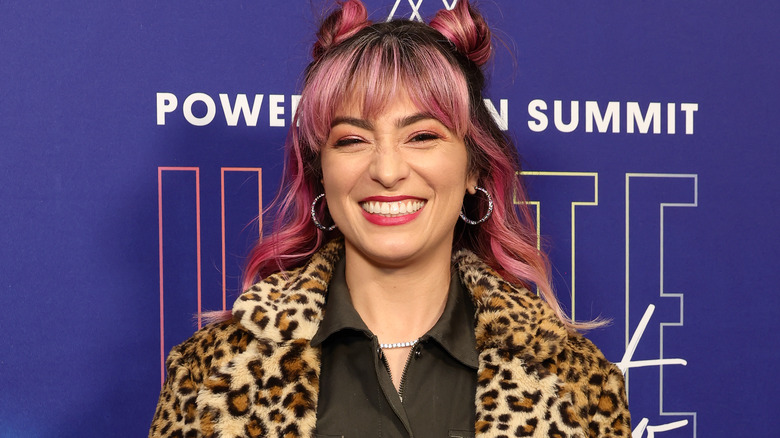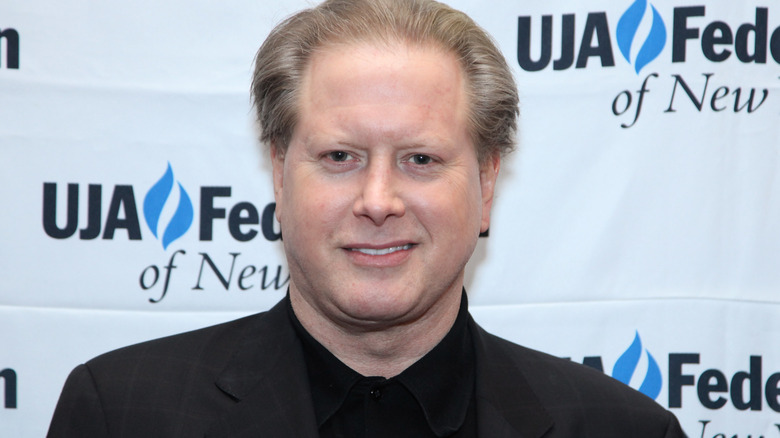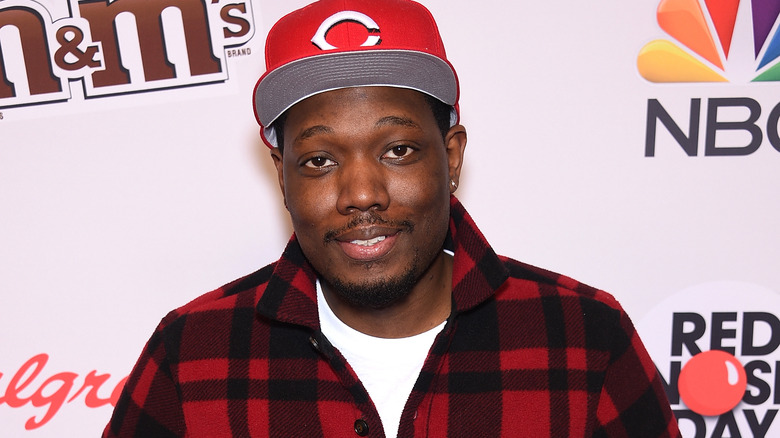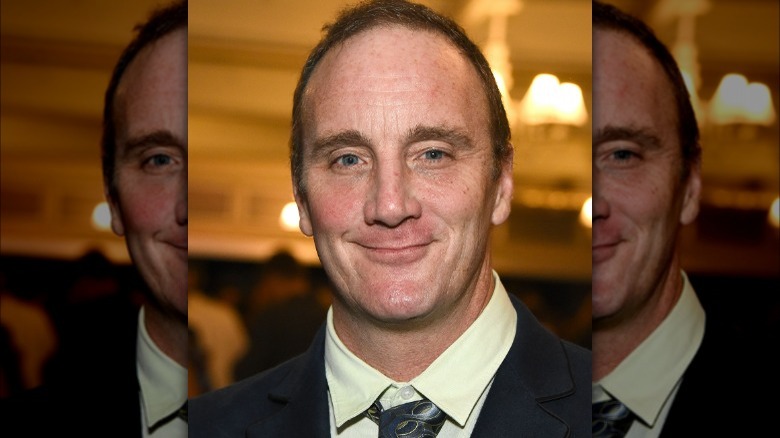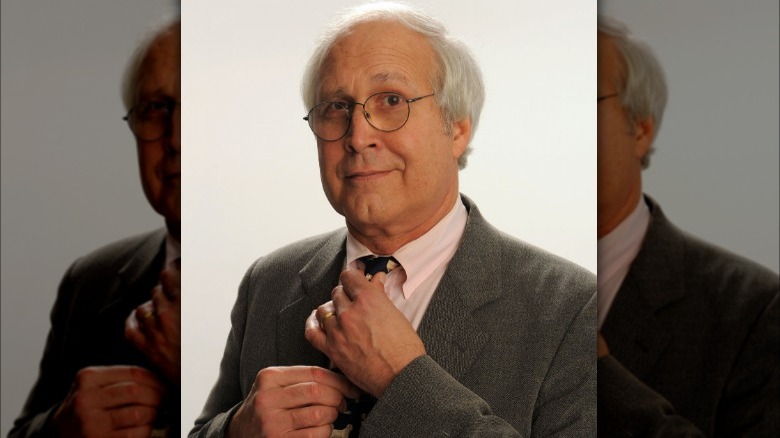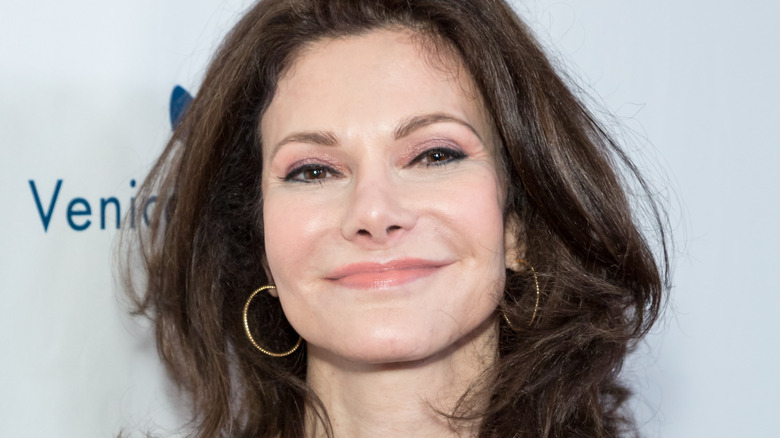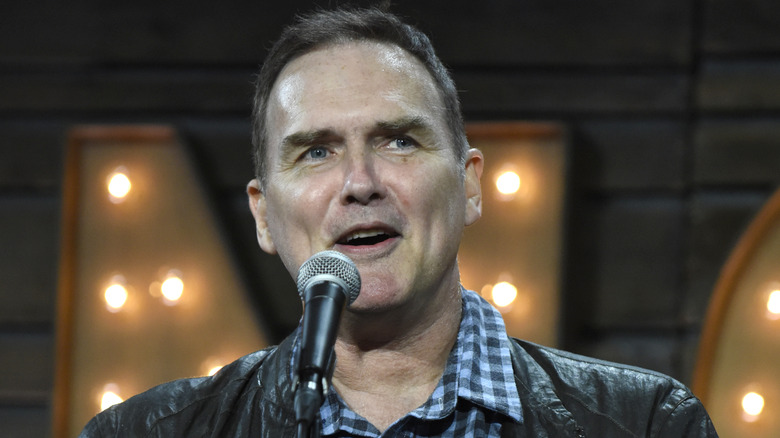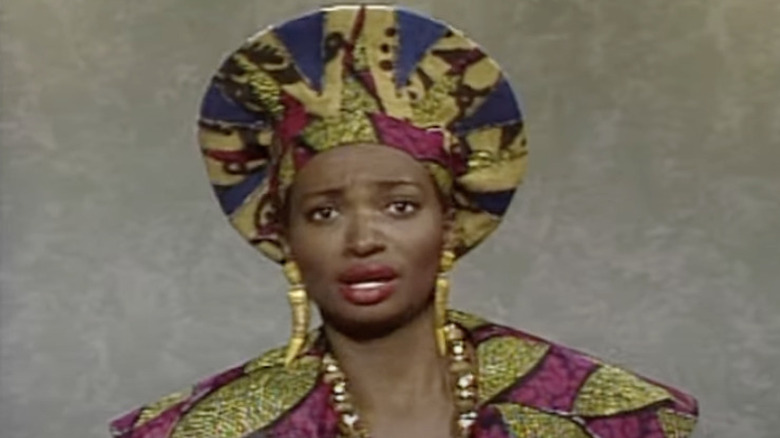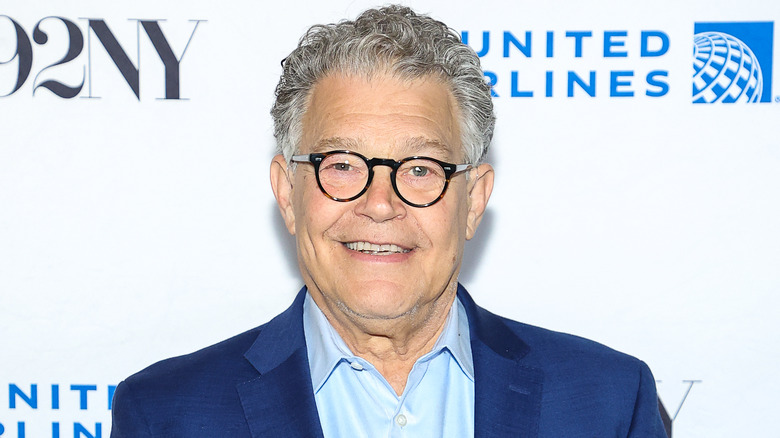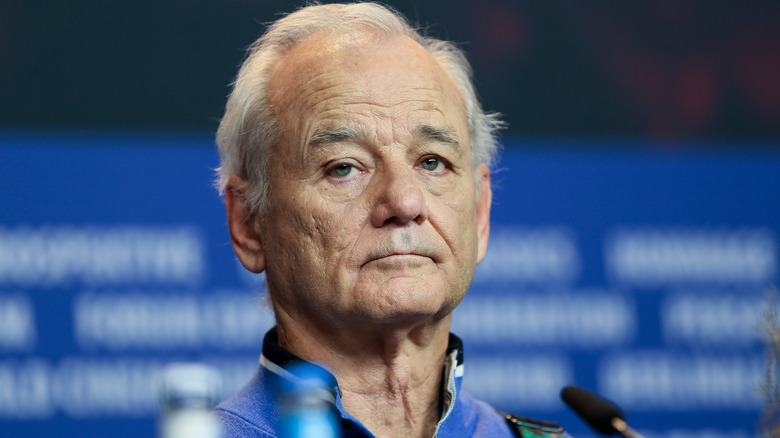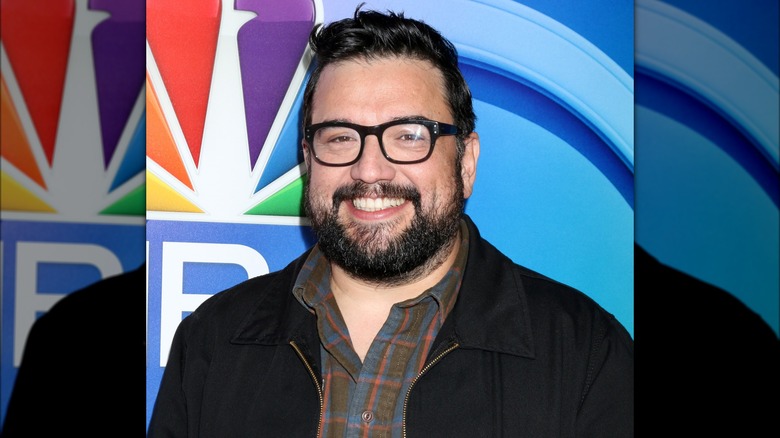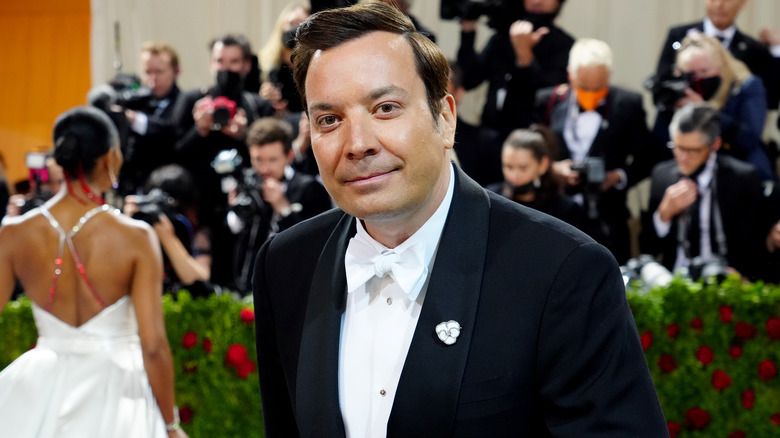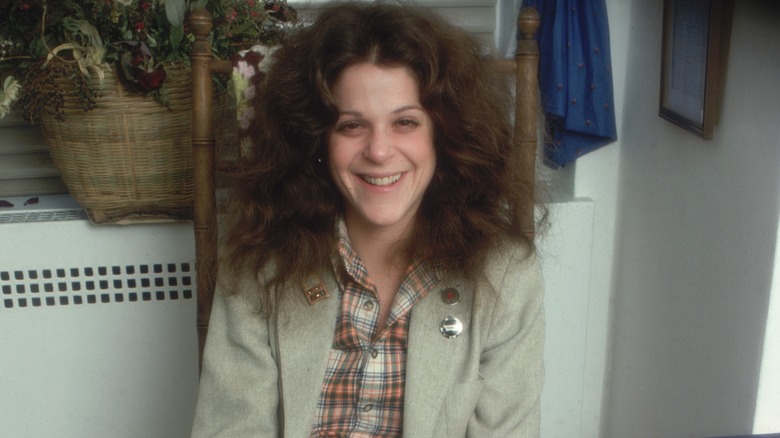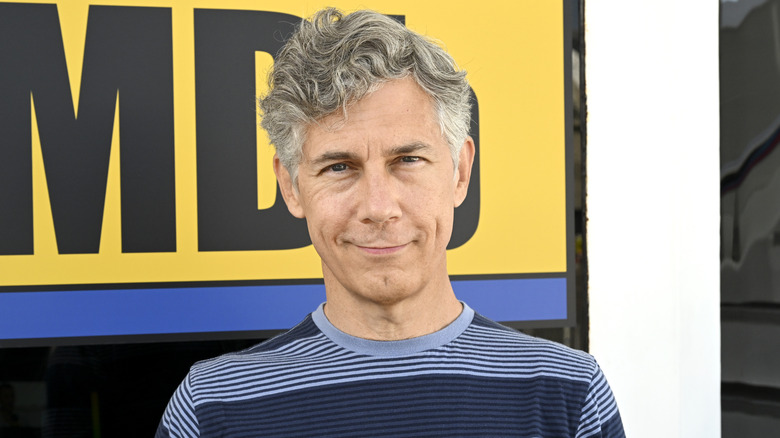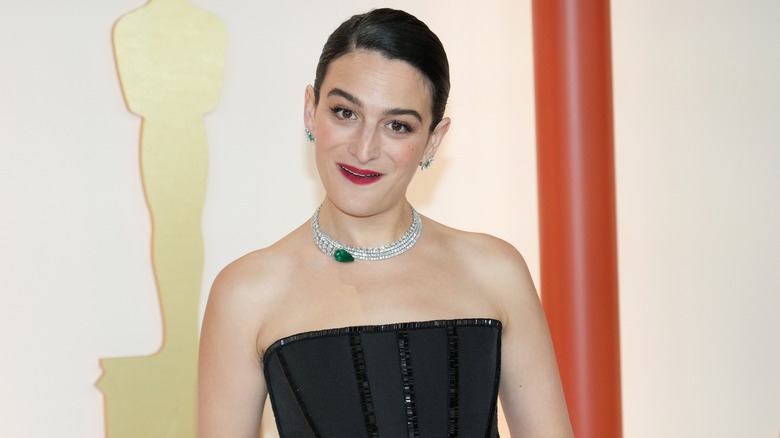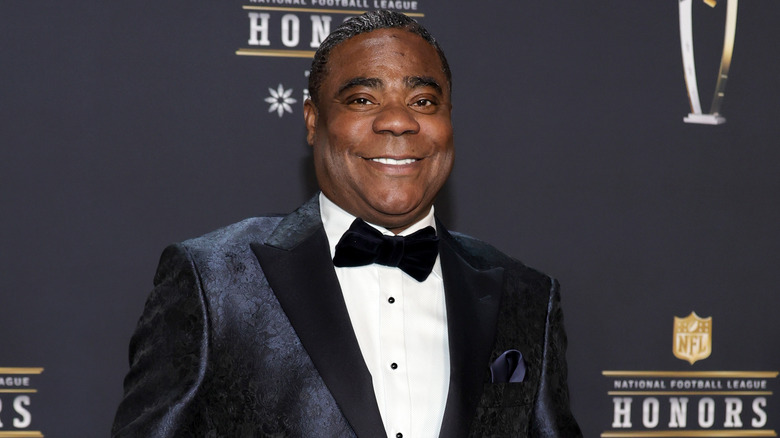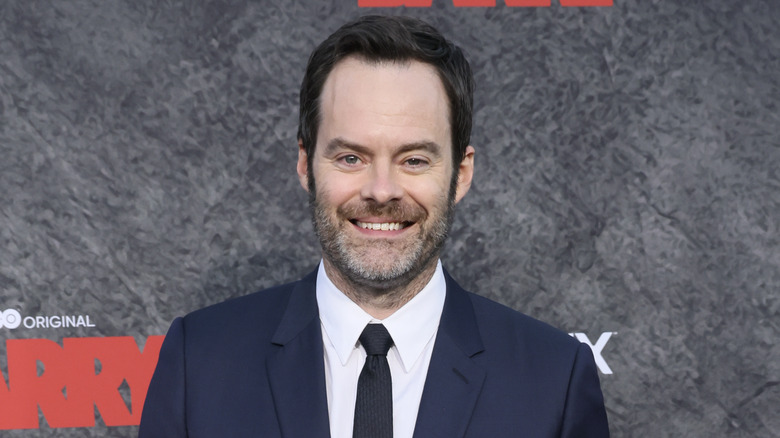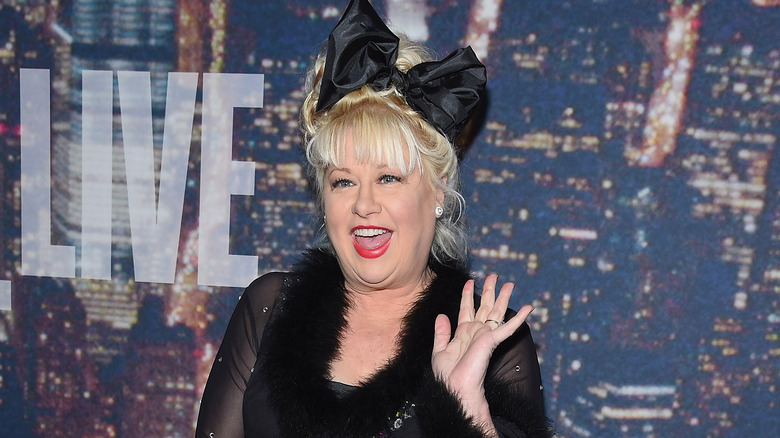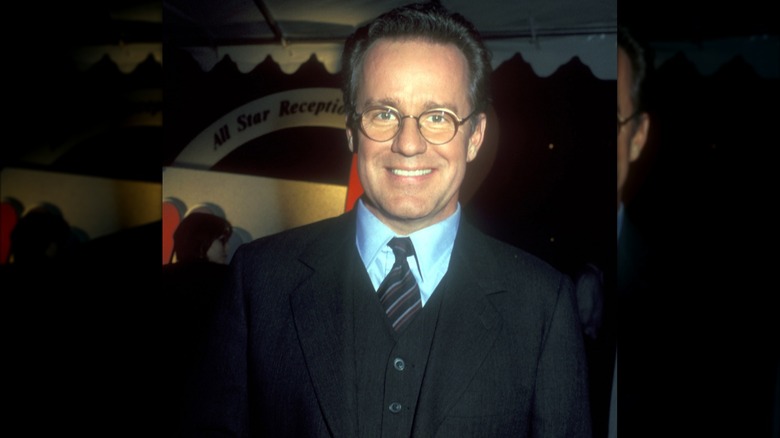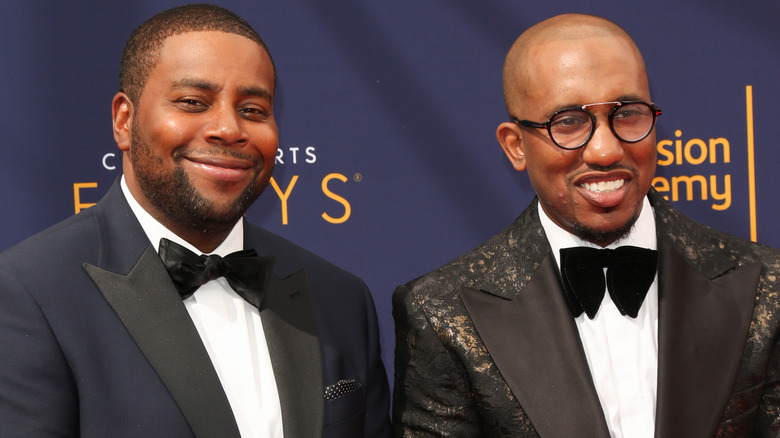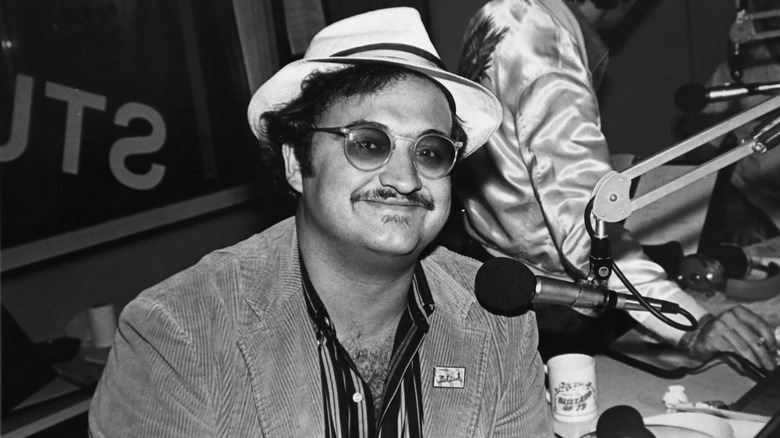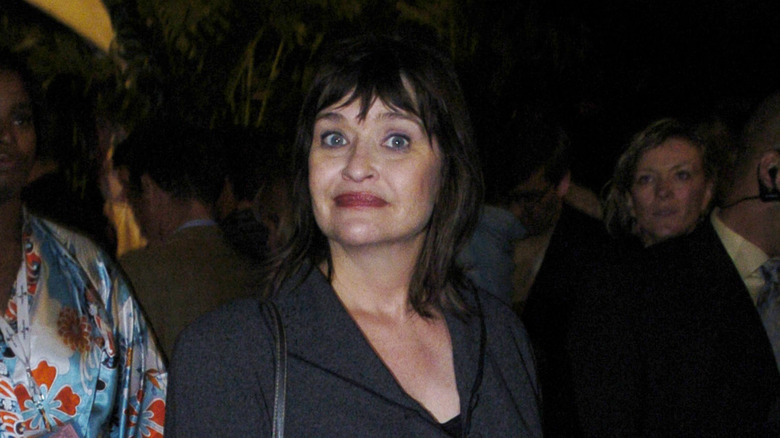Dark Secrets The Cast Of SNL Tried To Hide
This feature includes references to addiction, racism, homophobia, mental health issues, disordered eating, murder, suicide, and allegations of sexual abuse and child abuse.
Not only the gold standard in American sketch comedy, "Saturday Night Live" is probably the most prestigious late-night show in TV history. It's an institution that's been running on NBC's Saturday night schedule for nearly 50 years, generating catchphrases and helping to dictate the national conversation about politics and entertainment (depending on who was on the show and what they made fun of in any given episode). It's also routinely launched the careers of some of the biggest stars of movies and TV, including Bill Murray, Eddie Murphy, Julia Louis-Dreyfus, Mike Myers, Adam Sandler, Tina Fey, Amy Poehler, Will Ferrell, Pete Davidson, Kristen Wiig, Bill Hader, and Andy Samberg, to name but a few.
They may be some of the funniest, most talented, and most photogenic people in the world who made it to the comedy mountain of "SNL" and beyond, but these cast members are still just people. That means they're prone to the same scandals, gaffes, dumb ideas, and tragedies as the rest of us. Here are some of the darker and more unfortunate moments in the lives of "SNL" cast members.
Fred Armisen's 'horrible' marriage to Elisabeth Moss
Fred Armisen and Elisabeth Moss met while doing "Saturday Night Live" in 2008. He was a cast member, while she was doing a cameo on an episode hosted by her "Mad Men" co-star, Jon Hamm. Just a few months later they were married — it was the "happily ever after" part of a whirlwind romance. Well, not exactly. The marriage lasted just eight months before Moss filed for divorce.
Reflecting on the relationship with Vulture in 2014, she reasoned that she was far younger than she'd realized when she entered into what was admittedly an unpleasant union. "It was extremely traumatic and awful and horrible," she said of the marriage. "... [But] I'm glad that it didn't happen when I was 50. I'm glad I didn't have kids." Speaking to Page Six (via The Washington Post) she once sniped about Armisen, "The greatest impersonation he does is that of a normal person." Yikes.
While Moss has never dished on what happened in the relationship, Armisen has been a little more forthcoming. On an episode of "WTF with Marc Maron," he suggested that he's experienced repeated issues with intimacy and infidelity in his relationships and is prone to falling for the fantasy of a person — rather than committing to their reality. "I think I was a terrible husband," he proclaimed on "The Howard Stern Show" (via HuffPost) while discussing the ill-fated romance.
Tina Fey was attacked as a child
"Weekend Update" anchor, Sarah Palin impersonator, "Mean Girls" screenwriter, and "30 Rock" creator-star Tina Fey has a barely noticeable scar on the left side of her face. And the story of how Fey came to acquire that scar is shocking, to say the least — it's the result of a random and violent event she suffered as a child. While playing in front of her home in Upper Darby, Pennsylvania, a man she didn't know approached and without warning or clear motive, slashed the five-year-old Fey across the cheek with a knife.
In 2009, she told Vanity Fair that she was hesitant to ever discuss the incident due to people's instincts to sensationalize or glorify it. Still, she was determined to not let the traumatic incident affect her. "I proceeded unaware of it. I was a very confident little kid," she said. "It's really almost like I'm kind of able to forget about it, until I was on-camera."
As Fey wrote in her memoir, "Bossypants," throughout her life, the scar provided an air of intrigue. "Kids knew who I was because of it. Lots of people liked to claim they were there when it happened," she wrote. "Adults were kind to me because of it." It also became a factor in how Fey sizes up people. "People who ask about scar within one week of knowing me have invariably turned out to be egomaniacs of average intelligence or less," she reasoned.
Chris Farley tried really hard to get clean
Chris Farley was one of the all-time "SNL" greats for beloved early 1990s sketches like "Matt Foley, Motivational Speaker" (who quite memorably lived in a van down by the river), the "Gap Girls," and the nerve-addled "The Chris Farley Show." He went on to star in a handful of movies, including "Tommy Boy," "Black Sheep," and "Beverly Hills Ninja" before his tragic death at age 33 in December 1997, of an accidental overdose.
Farley had an addiction to multiple drugs, and he tried mightily hard to get clean. Entertainment Weekly reported that in the last two years of his life, he enrolled in 17 different drug rehabilitation programs. On the set of what would be his final movie, "Almost Heroes," Farley allegedly drank so excessively that producers told him they'd shut the movie down if he didn't get sober. He obliged and hired a sobriety guard who watched him for the entire shoot and made sure he didn't drink or take drugs.
The last time Farley would seek treatment was a single night at the renowned Hazelden center in Minnesota a week before he died. During a Rolling Stone interview, Farley had once shared his fears that his drug use would influence young fans, in the same manner as he had looked up to the late John Belushi as an adolescent. "I thought that this is what you have to do to be cool," he mused. "But all that s*** does is kill someone."
Chris Kattan secretly dealt with some serious health issues
Chris Kattan has kept a relatively low profile since leaving "SNL" in 2003. The erstwhile "Goth Talk" host went on to co-star on ABC's "The Middle" for a while, and in 2017 competed on the network's "Dancing with the Stars." He was the first contestant eliminated in his season. But frankly, it's remarkable that he was even able to submit to the extreme physical rigors of the dance competition.
While doing press for the show, Kattan told People that about 20 years earlier, he broke his neck after a stunt he performed had gone wrong. The injury had effects throughout Kattan's body, and doctors were concerned that he'd be paralyzed if he didn't receive correct and timely medical intervention. He's since had four surgeries to attempt to correct those problems, including one in his throat and one on his back.
However, complications from the injury were wide-reaching — indeed, they prevented him from doing physical comedy. He even kept his experiences a secret because he worried his injury would cost him roles. "[The media] started comparing me to others," he noted. "Like, 'Why isn't he working and Will Ferrell is? ... It was hard." Kattan has in part blamed being in pain —and using strong pain-alleviating medications — for some of his past, tabloid-worthy behavior, such as his 2014 DUI arrest and his erratic behavior in an airport a year later, which saw him being removed from the location.
Eddie Murphy has fathered many kids with many women
Eddie Murphy is one heck of a family man. In fact, the star has fathered nine children with five different women — as of this writing, at least. A rundown of Murphy's dizzying romantic and virility history starts with a brief relationship in 1989 with a woman named Paulette McNeely, which resulted in a son, Eric Murphy. Then in 1990, Murphy and Tamara Hood Johnson had a son together named Christian. That same year, model Nicole Johnson gave birth to Murphy's daughter, Bria, the first of the five children they'd have together. Murphy and Johnson married in 1993 and divorced in 2006. The next year, Melanie Brown, aka Mel B., aka Scary Spice of the Spice Girls, gave birth to a baby girl named Angel ... whom Murphy denied fathering until a DNA test proved otherwise. Murphy's youngest children are a daughter named Izzy and a son called Max, whom he had with model Paige Butcher in 2016.
By all accounts, Murphy is extremely proud of his large brood. Speaking to The Mirror in 2021, he gushed, "I love fatherhood. That is the center of everything." He added that over the years he'd learned that prioritizing his children's lives and well-being kept him on a good path. It appeared to have kept his kids in check too. "Nobody is like the Hollywood jerk kid," he noted. "My kids are smart and are trying to do stuff. I am blessed with my kids. I really, really got lucky."
Melissa Villaseñor deleted tons of questionable tweets
One of the new additions to the cast of "Saturday Night Live" for the 2016 to 2017 season was Melissa Villaseñor. A gifted impressionist, Villaseñor was the first Latina cast member in "Saturday Night Live" history. A win for diversity, sure, but her sudden rise to the pre-eminent comedy show wasn't without controversy. Social issues writer Aura Bogado and activist April Reign (who started the #OscarsSoWhite campaign) discovered that Villaseñor had apparently thoroughly scrubbed her Twitter account and deleted around 2,000 tweets just before her "SNL" debut. Per BuzzFeed, Bogado and Reign highlighted that many of these posts appeared to be phrased as jokes but featured a variety of racist statements (a representative for "SNL" and Villaseñor told the outlet they would not be commenting on the matter.)
Villaseñor's exit from "Saturday Night Live" in 2023 was also dramatic, if not traumatic. "At the end of the day, it was about my mental health. Last season, I had a couple of panic attacks," Villaseñor told The Daily Beast. "I was struggling." That exit appeared to arrive after Villaseñor liked or responded to tweets from people who felt she was underutilized on "SNL." "The show's treatment of [Melissa Villaseñor] is simply galling, and given her great talent, has seemingly become open disdain. I can't stand it," sportswriter Jon Weisman tweeted. She responded, "Thanks foo, I agree haha."
Darrell Hammond experienced severe mental health issues
Darrell Hammond is arguably the best celebrity impressionist "SNL" has ever had in its cast, turning in uncannily accurate impressions of Al Gore, Bill Clinton, and Donald Trump, to name but a few. But for as much joy as he brought viewers in his 14 seasons on the show, the comic talent has struggled with the dual miseries of addiction and self-harm.
In his harrowing 2011 memoir, "God, If You're Not Up There, I'm F***ed" (via ABC News), Hammond wrote of the extensive abuse his mother dished out, saying that she hit him, stabbed him, and tortured him. The comedian has been in therapy since age 19, but it wasn't a cure-all. He self-medicated and would engage in self-harm backstage at "SNL." "Most of the time it was really manageable," Hammond said on NPR's "Fresh Air." "But if you added a pint of [alcohol] to the equation, then sometimes it got a little messy."
Hammond says that on multiple occasions he sought the help he needed, checking himself into a New York psychiatric hospital. He also received support from "SNL" producers, who considered whether the show was a threat to his mental health and if he could handle the job still. "They were extremely helpful to me," he added. "... [It] was a delicate balance for them, and not one that they should have had to go through." He told CNN that he was once even placed in a straightjacket and taken to hospital, straight from the set.
Chris Rock blamed himself for the end of his marriage
Chris Rock and Malaak Compton-Rock met in 1994 and were wed two years later. They seemingly had one of the more stable marriages in Hollywood, where it's an accurate cliché that relationships don't seem to last very long. So, it was a little shocking when the couple, who had two daughters together, separated in 2014, with the divorce finalized in 2016.
What happened? Well, those two decades together hadn't been altogether blissful. In 1998, the couple separated, a period in which Chris hooked up with a model named Monika Zsibrita, who later had a child she claimed was his. Two DNA tests proved otherwise. However, Zsibrita later filed a report with the Los Angeles Police Department that claimed the sexual encounter was actually sexual assault. Chris denied the claims and accused her of trying to scam him. During the trial against Anthony Pellicano, it was revealed that the comedian had hired the notorious Hollywood fixer to try and resolve the situation, per the Los Angeles Times.
The comedian has suggested that he had a problem with remaining faithful to his wife. "I was a piece of s***," Chris said in a candid post-divorce comedy set in which he also talked about indiscretions with three different women, per Rolling Stone. During another show, he reflected that it was inappropriate for him to take digs at the relationship on stage. "It's not fair," he said. "I have a mic, she doesn't."
Michael Che made a bad joke about catcalling
"Weekend Update" co-anchor Michael Che may deliver cutting, insightful jokes on a regular basis, but he was accused of missing the mark in 2014. It started when viral video agency Rob Bliss Creative posted a YouTube video called "10 Hours of Walking in NYC as a Woman." As a woman walked down the street, she was bombarded with more than 100 instances of men hitting on her, leering at her, or following her. The unsettling, shockingly revelatory video racked up millions of views, while Che offered up his own think-piece on his Instagram account — via a since-deleted sarcastic defense of catcalling. "I wanna apologize to all the women that I've harassed with statements like 'hi' or 'have a nice day' or 'you're beautiful,'" he wrote. "I can't imagine what that must feel like."
When he received backlash for his quip, he couldn't leave well enough alone, penning another short (and deleted) Instagram post in which he said he wasn't really sorry for any of it, "I wanna apologize for my last apology. Sometimes I forget that I belong to all of you now, and that any thought I have should be filtered through you, and receive your approval. It's tough, because I'm used to taking risks and finding humor in places of discomfort. But thats all over, 'cause I have a job on TV." Speaking to Entertainment Weekly two years later, he insisted it was simply a joke gone awry. "My position was always that catcalling sucks," he stated.
Jay Mohr stole another comedian's work for an SNL sketch
Star of multiple short-lived sitcoms ("Action," "Gary Unmarried") and his own sports talk radio show, Jay Mohr got his big break when he landed a job as a featured player and writer on "Saturday Night Live" in 1993. But amidst the high-pressure and competitive environment, Mohr struggled to get his sketches or himself on the show. In "Gasping for Airtime," his 2004 memoir about his time at "SNL," Mohr admitted that he got so desperate that he stole material from a stand-up. "I took Rich Shapiro's act and wrote it down word for word and submitted it as my sketch," Mohr wrote of the sketch he titled "O'Callahan and Sons," about an angry Irish bartender. "For a few weeks after the show aired, I avoided going to the comedy clubs for fear of bumping into Rick or any comic who had ever seen him perform, which was all of them," Mohr wrote.
Amazingly, the sketch made it into a March 1995 episode hosted by Paul Reiser. But before long, "SNL" higher-ups found out about the theft. Mohr's sketch was deleted from future reruns of the episode and the writer-performer was fired two months later. In his book, Mohr wrote that NBC and Shapiro reached a financial settlement over the matter, but that might not be true. "[Mohr] said I was getting paid, I didn't get paid a dime," the comic claimed during a stand-up gig. "So he lied again after he confessed."
Chevy Chase is reportedly quite difficult to work with
On-screen, Chevy Chase has usually played charmingly smug and slightly aloof guys. Off-screen, he's earned a reputation as someone who's mean and nasty. When he returned to host "Saturday Night Live" in 1985, he allegedly pitched an appalling idea to cast member Terry Sweeney, the show's first openly gay performer. In the book, "Live From New York," Sweeney claimed that Chase said, "I've got an idea for a sketch for you. How about we say you have AIDS, and we weigh you every week?" While he was forced to apologize, he was still invited back to host again ten years later. In the same book, Will Ferrell called him the show's worst host and alleged that he sexually harassed a female writer.
In 2009, Chase joined the cast of "Community" where he repeatedly clashed with showrunner Dan Harmon over the direction of his character, Pierce Hawthorne. During a Reddit AMA, Harmon alleged that the veteran star had refused to film a scene and had walked off the set in protest. Speaking to The Hollywood Reporter, he claimed that Chase had a problem with his character being depicted as a confused, unattractive old man — when, to his mind, he was still super sexy and with it. Meanwhile, Donald Glover claimed to The New Yorker that Chase would make racist jokes between takes.
When questioned about his bad reputation by "CBS Sunday Morning" in 2022, Chase responded, "I don't give a crap ... I am who I am."
Did Laura Kightlinger's script idea get stolen?
One of the most prominent stand-up comedians of the early 1990s, Laura Kightlinger joined "Saturday Night Live" as a cast member and writer for the 1994 to 1995 season. Exiting after that sole year as part of a massive cast switchover, Kightlinger went on to create "The Minor Accomplishments of Jackie Woodman," write for "2 Broke Girls" and "Will and Grace," and pen an unproduced screenplay about a woman who grows consumed with rescuing stray cats titled, "We're All Animals." Kightlinger based the script on personal experiences, such as installing feeding areas for unhoused cats at CBS Studios.
In 1996, she met an up-and-coming filmmaker named Mike White — a pal of "Tenacious D" star, Jack Black, whom she was dating at the time. During discussions about their respective ideas, Kightlinger shared her goal to write a script about women who rescue animals. In 2002, Kightlinger finished the screenplay and showed it to White. "I read it and told her it was great," he told the Los Angeles Times. Two years later, Kightlinger tried to get the script produced, but no studios were interested.
Then, in 2005, Kightlinger read that White had signed a deal to make "Year of the Dog" — a film about a woman whose life is in disarray because she spends too much time rescuing dogs. Although the "White Lotus" creator maintained he based the movie on his own experiences, Kightlinger accused him of lifting her idea and sued him. A court ruled in his favor.
Norm Macdonald had a gambling addiction
After every episode of "Saturday Night Live," the cast decamps to a restaurant or bar to party into Sunday. According to David Spade on an episode of "Norm Macdonald Live," Norm Macdonald would often skip the festivities and use NBC's car service to head to the casino town of Atlantic City, New Jersey, where he'd gamble away his earnings.
But one stroke of good luck would turn into a gambling problem for the comedian. "I was a casual gambler, go and bet $25 on blackjack. I hit a craps table and went on a gigantic run, won, you know, six figures, and ever since then you can't go back," Macdonald explained on "Larry King Now." "If you win that much money you can't go back to $25 bets." And so he didn't. Macdonald demurred from cashing in all the chips from that $100,000-plus win, keeping them in his home freezer, and eventually gambling them all away. Ultimately, Macdonald would go broke from gambling, and then, after building his savings back up, he lost it on games of chance once more.
Macdonald died in September 2021 at age 61, after a recurrence of cancer for which he'd been diagnosed eight years earlier. Macdonald never publicly disclosed that he was in treatment for a serious disease. "Norm had the most unique comedic voice I have ever encountered and he was so relentlessly and uncompromisingly funny," Conan O'Brien tweeted. "I'm so sad for all of us today."
Ellen Cleghorne got paid next to nothing on SNL
The early 1990s was among the most talent-stocked eras in "Saturday Night Live" history. Veteran players like Dana Carvey mingled with rising stars like David Spade and Ellen Cleghorne, a cast member from 1990 to 1995 who made an indelible impression with popular recurring characters like Zoraida the NBC Page and Queen Shenequa. Despite its ensemble format, "SNL" didn't pay its bevy of stars even roughly similar amounts, and Cleghorne was said to be egregiously under-compensated relative to what her coworkers could command.
On a 2022 episode of "Fly on the Wall with Dana Carvey and David Spade," an "SNL"-themed podcast hosted by two of her former costars, Cleghorne brought up the rarely discussed topic of cast salary. Carvey admitted that upon his hiring at the show in 1986, he started at $4,500 an episode. Spade revealed that when he came aboard in 1990, he got $900 each week for writing, with a $1,500 bonus if he acted in a sketch. "I'll tell you how much I started at — $245 an episode," Cleghorne said. "Nothing extra if I got anything on the show, and nothing for writing." Her final salary in 1995? "$4,500 an episode. Nothing for writing, and that's it," she stated.
Cleghorne claimed that the higher-ups didn't see the issue with her measly pay as it was in line with union minimum wage — and she only technically worked one day a week. "That's a joke," Spade reflected. "Because it's 24 hours a day on your mind."
Al Franken was accused of sexual misconduct
As an original staff writer and occasional performer (notably as fragile self-help guru Stuart Smalley), Al Franken helped mold the format and sensibility of "Saturday Night Live" over its first 20 seasons. While he'd later occasionally show up for a cameo, Franken departed "SNL" in the mid-1990s to focus on political satire, hosting a show on progressive talk radio network Air America and writing the 1996 bestseller "Rush Limbaugh Is a Big Fat Idiot and Other Observations." In 2008, Franken took his political leanings to the next level and won the election to represent his home state of Minnesota in the U.S. Senate.
In 2017, during his second term, eight women came forward to accuse Franken of improper conduct, such as kissing and groping, according to ABC News (he denied many of the allegations). Radio host Leeann Tweeden alleged that during a 2006 USO tour, Franken touched her while she slept on a plane and also forcefully kissed her during a rehearsal, both without consent. Franken publicly and privately apologized to Tweeden, and to some of his other accusers. "I respect women. I don't respect men who don't," Franken said as part of a larger statement published by The New York Times. "And the fact that my own actions have given people a good reason to doubt that makes me feel ashamed." In January 2018, Franken responded to the scandal and allegations by resigning his U.S. Senate seat.
Bill Murray was accused of mistreating costars
Following a distinguished run on "Saturday Night Live" in the 1970s, Bill Murray went on to become one of the most reliable comic movie stars of the next few decades, starring in "Caddyshack," "Stripes," "Ghostbusters," and "Groundhog Day," among others. In 1990, Murray starred in and co-directed the crime comedy "Quick Change," opposite Geena Davis. However, 32 years later, she accused him of enacting abuse and improper conduct toward her during the making of the film.
In her memoir, "Dying of Politeness" (via E! News) Davis alleged that she landed the role following a hotel room meeting with Murray and other members of the production, where he tried to use a massaging device on her. Despite her frequently stated discomfort with the idea, he purportedly persisted — apparently, in a bid to see if she would be an obedient worker. "Pretty quickly, it was clear that this was a non-negotiable thing," she wrote. Davis also alleged that Murray screamed at her in front of 300 people because she was waiting for a costume fitting. The experience left her shaken.
Other coworkers accused Murray of on-set misbehavior. During an episode of the podcast "Asian Enough," Lucy Liu accused him of verbally insulting her multiple times during the filming of "Charlie's Angels." In 2022, filming ended on "Being Mortal" after a member of the production lodged a complaint against the actor. Speaking to CNBC, Murray described the incident as a clash of opinions and insisted that he was trying to learn from his mistakes.
Pete Davidson's long history of self-medicating
In 2014, stand-up comic Pete Davidson joined "Saturday Night Live" at just 20 years old. A longtime, open user of marijuana, Davidson said in his stand-up special "Alive From New York" that his copious use of the substance backstage at "SNL" earned the ire of guest host Louis C.K., who reported him to show producers.
In 2016, Davidson told "High Times" (via People) that he used marijuana to self-medicate for Crohn's disease, with which he was diagnosed as a teenager. "My stomach would be in pain all day and I wouldn't be able to eat, but then I'd smoke and I can eat and do my shows," he said. Six months later, in a since-deleted Instagram post, he explained the reason for his brief absence from "SNL" and social media, writing, "I quit drugs and am happy and sober for the first time in 8 years." Having enrolled in a rehabilitation program at that time, he eventually came to the realization that his weed use wasn't the problem, and he felt just as bad sober as he did using drugs, per "The Howard Stern Show" (via People).
During an appearance on "Open Late," he elaborated that at that time he'd also been diagnosed with borderline personality disorder. He experienced an epiphany upon concluding that marijuana actually helped him to manage his symptoms. "I found out I had a mental disorder. I thought I had a drug problem," he said. "It's a completely different thing."
Horatio Sanz was accused of grooming a teenager
Horatio Sanz, a cast member of "Saturday Night Live" from 1998 to 2006, was named as the defendant in a 2021 lawsuit, along with SNL Studios and "SNL" parent company, NBCUniversal. Per NBC News, an anonymous woman accused Sanz of sexual assault and grooming while she was a minor. The woman ran an "SNL" fan website and alleged that Sanz and his frequent sketch partner Jimmy Fallon answered an email she sent in January 2000, when the woman was 15 — she claimed they were both aware of her age. Later that year, she met Sanz in person at an "SNL" broadcast, where he was accused of flirting with the young girl and of showing her physical affection.
The woman furthermore alleged that she frequently attended "SNL" tapings and that Sanz would bring her to cast parties, where she was served alcohol and engaged in drug use. The lawsuit additionally accused Sanz of having groomed the young woman online, giving her proprietary "SNL" news to break on her blog, while also engaging in cybersex with her. She also claimed that the comedian had sexually assaulted and harassed her in the presence of NBC employees.
While Fallon didn't comment on the lawsuit, Sanz's attorney accused the plaintiff of requesting $7.5 million prior to filing the lawsuit, in exchange for her silence. "We, of course, refused and will vigorously contest these totally meritless claims," he noted, per E! News. In November 2022, both parties agreed to dismiss the suit, per NBC News.
Was Jimmy Fallon a moody monster to his Tonight Show staff?
Funnyman Jimmy Fallon was a staple on the "SNL" stage before he made his way to other late-night shows like "Late Night with Jimmy Fallon" and eventually taking over the reins on "The Tonight Show" in 2014. But as his star began to rise as the host of one of the most recognizable late-night programs, rumors of his bad reputation began to swirl before eventually coming to a head in 2023. That September, Rolling Stone published a blistering exposé that included 16 different accounts of Fallon's allegedly less-than-stellar behavior on and off set. "Nobody told Jimmy, 'No,'" one of the anonymous sources claimed. "Everybody walked on eggshells. ... You never knew which Jimmy we were going to get and when he was going to throw a hissy fit."
Fallon was quick to privately respond to the damning article, which was heightened by the Writers Guild of America strike that had paused most scripted programs, including "The Tonight Show." Rolling Stone published another article within 24 hours, stating that Fallon and show executives reportedly held an "all call" Zoom meeting for the staff. Employees told the magazine that Fallon allegedly expressed the following: "It's embarrassing and I feel so bad. Sorry if I embarrassed you and your family and friends. ... I feel so bad I can't even tell you."
Noting that he didn't want to "create that type of atmosphere for the show," Fallon apparently added, "I want the show to be fun, [it] should be inclusive to everybody. It should be the best show."
Gilda Radner struggled with an eating disorder in her youth
Gilda Radner was the first comedian cast on "Saturday Night Live" in the mid-1970s, and her funny lady legacy was secured with classic characters like Roseanne Roseannadanna and Baba Wawa (her take on Barbara Walters), as well as her own larger-than-life persona. But her sunny disposition often hid some dark secrets, which were brought to light in both her 1989 memoir "It's Always Something" and the 2018 documentary film "Love, Gilda."
Radner struggled with an eating disorder from a very young age, which she talked about candidly in both her writing and in home videos sourced in the documentary. "I overate constantly," Radner revealed in a clip used in the film. "My weight distressed my mother, so she took me to a doctor who put me on Dexatrim diet pills when I was 10 years old." The disorder took such a toll on the star that she eventually checked herself into a hospital during a break from "SNL" in an effort to recover. Despite her ongoing resilience (she continued performing throughout her illnesses), Radner would sadly die of ovarian cancer in 1989 at age 42. This prompted her widowed husband, Gene Wilder, to co-found Gilda's Club (now part of the Cancer Support Community), a nationwide network of support groups for women with cancer.
"Even in [her] journals, Gilda could write an entry that was really heartbreaking, but there would still be humor in it," documentary director Lisa D'Apolito told the New York Post. "There would still be something positive."
Chris Parnell got fired from Saturday Night Live – twice
Chris Parnell was a major ensemble player on "Saturday Night Live" at the turn of the 21st century. He spent eight years on the show from 1998 to 2006, appearing alongside the likes of Will Ferrell, Maya Rudolph, and Andy Samberg. Parnell holds a unique title at the late-night staple: he is the only cast member to get fired twice by show creator Lorne Michaels.
Parnell was first let go after closing out his third season in 2001, allegedly due to budget cuts. "It was pretty rough," he shared on the Daily Beast podcast "The Last Laugh." "I had come to realize how much of my identity at that point was wrapped up in being a 'Saturday Night Live' cast member. And then very shortly thereafter I started to hear from people who worked on the show ... that the door wasn't completely shut, that I might be going back. So it was this roller coaster for a while." Parnell was eventually brought back halfway through the next season — but was cut again in 2006. "It was much easier to take that time because I had a sense that it might be coming and I'd gotten to go back for five more seasons and do a lot more stuff," he shared.
But Parnell does get to hang on to one bright memory of the notoriously tough Michaels: "Lorne, to his credit ... admitted that he made a mistake, which was really cool of him," Parnell told Vulture.
Anthony Michael Hall dealt with alcoholism as a teen
At age 17, '80s teen star Anthony Michael Hall made "Saturday Night Live" history as the youngest cast member when he joined in 1985 alongside fellow '80s heartthrob Robert Downey Jr. Unfortunately, the experience as a whole is not something that Hall looks back on fondly. "To be very honest and candid with you, it was not great — it was a shaky-legs season," he told the Independent. "I'm grateful for the experience, but I didn't have a breakout season. I didn't even have any breakout characters or anything like that."
It wasn't just his overall experience that was a dark shadow on his time in Studio 8H. Hall was also in the throes of severe alcoholism during that time. The struggle was exacerbated by his bi-costal lifestyle, which found him flying weekly to NYC from Los Angeles, where he split his time between "SNL" and movie sets. "I was rude to a lot of people," he revealed to the Los Angeles Times. "I was drinking on set ... and had a problem with alcohol that I've taken care of and will continue to take steps to take care of. ... The whole thing was overwhelming sometimes."
Hall was fired at the end of the season along with most of the other cast members, but would become sober in the early '90s. He has since faced a number of controversies and accusations throughout his career.
Mike Myers is allegedly a pain to work with on set
In 1988, Mike Myers was hired by "SNL" creator Lorne Michaels in an unconventional way: without an audition. "[It] was crazy and out of the blue," Myers told Metrograph in 2023. "... I didn't audition. If I had auditioned, I don't think I would have gotten in."
Myers went on to become a comedy staple both on and off the show, with his name becoming synonymous with comedic lighthouses including "Wayne's World," "Austin Powers," and "Shrek." But his early successes and continued stardom were underlined with a reported difficulty that followed him on sets. Ever since his first big feature film, "Wayne's World," in 1992, there have been reports of alleged shouting matches and diva-ish behavior. "I'm very passionate about my work. I care a lot," Myers told the Los Angeles Times back in 1993. "... We were all very passionate [on set]. Some people misinterpreted my passion as insanity." Myers' alleged on-set behavior became so synonymous with his name that he's frequently been listed as one of the most difficult actors to work with in Hollywood. Some former collaborators, like "Wayne's World" director Penelope Spheeris, have even admitted that they "root against him" because of it, per Entertainment Weekly.
But not everyone Myers has worked with has given up on collabing with the actor in the future. "I'd make 10 movies with Mike in a heartbeat, but you've got to take it as seriously as he does, and he gives 150 percent," producer Michael De Luca told EW in 2008.
Jenny Slate's SNL experience caused her to develop serious stage fright
For a single season in the late aughts, Jenny Slate made her mark on the "Saturday Night Live" stage alongside heavyweights like Kristen Wiig, Bill Hader, and Jason Sudeikis. Memorably, her very first appearance on the show was made infamous by an impromptu F-bomb she dropped in a sketch alongside Wiig. "Everyone always thinks I got fired for saying f***: I didn't, that's not why I got fired," Slate clarified to InStyle in 2019. "I just didn't belong there. I didn't do a good job, I didn't click. I have no idea how ['SNL' creator] Lorne [Michaels] felt about me. All I know is, it didn't work for me, and I got fired."
Slate then endured several years of severe stage fright after her single-season experience, which almost caused her to stop performing stand-up altogether. Calling her experience "very intense" and "really disappointing," she shared with "The Off Camera Show," "After I got fired, I was so humiliated in every way. ... I couldn't get over it, I was too sensitive. ... I couldn't do my stand-up joyfully, I was like a ghost of myself."
Luckily for audiences, Slate was able to work through her fears post-"SNL" and has since experienced a flourishing career in Hollywood, appearing in comedy shows like "Parks and Recreation," numerous films, and even releasing her own Netflix comedy special. Plus, she's the voice behind the beloved "Marcel the Shell with Shoes On," an ongoing project that resulted in an Oscar-nominated film released in 2021.
Tracy Morgan faced death and drug deals
Tracy Morgan was an "SNL" mainstay from 1996 to 2003 before later co-starring on castmate Tina Fey's Emmy Award-winning sitcom "30 Rock." After a serious car crash almost killed him in 2014, Morgan eventually made his way back to the "SNL" stage as a host, resulting in a homecoming that was a long time coming for the comedian. "When I went home [to 'SNL'], I was in the pitch meeting and this young cast ... I know they were doing their hardest pitches, their best pitches, and they inspired me so much," Morgan told "The Howard Stern Show," explaining how he headed over to the Comedy Cellar following the meeting. "I grabbed the mic for the very first time [since the accident]. ... I will always forever be indebted to that cast for inspiring me to go back and be funny."
But Morgan's troubles started long before his accident, or even his time in Studio 8H. "I sold crack, yeah, but I was a crack dealer with a heart of gold," he shared on "Conan." "I would sell them crack but then feel sorry for them." Morgan channeled those experiences, and his love for his hometown of Brooklyn, loosely into the show "The Last O.G.," which ran for four seasons on TBS. "This is not a show about the community," he told The New Yorker. "This is a show starring the community. Print that!"
Bill Hader struggles with severe anxiety
"SNL" star Bill Hader became a fan favorite during his eight years on the show with now-iconic characters like Stefon and Herb Welch. For all the laughs that he garnered over the years, many might think he would be a natural in front of the camera. But in reality, Hader faced pretty severe stage fright at times on account of his anxiety. At one point, he began to have a panic attack moments before going on camera. "It felt like someone was sitting on my chest," he recalled to Grantland. "I couldn't breathe, I started sweating. I thought, 'This is not good — abort! abort!' I remember getting my makeup taken off and saying, 'I don't know what's going on out there. I don't know what just happened.'"
But the Emmy Award-winning actor hasn't let his anxiety completely control him; rather, he has learned to embrace it (within reason), work through it, and incorporate it into his work. In particular, he channeled the nervous, often frenetic energy he's felt into the award-winning HBO show "Barry," which he co-created and starred in throughout four seasons. "The biggest thing I've learned about anxiety is that the more I fought it, the worse it got," Hader told Men's Health. "So, you kind of have to let it in, and just say, like, 'Well, I'm anxious.' It can be so overwhelming ... [but] it's very cathartic to be able to put that stuff in for the characters, and also use it in the performance."
Victoria Jackson's divisive beliefs blasted her out of showbiz
For six seasons, Victoria Jackson was known for her bits and characters on "Weekend Update," then hosted by Dennis Leary, on "Saturday Night Live." When she departed, Jackson initially claimed she left of her own accord to star opposite a pre-"ER" George Clooney in a sitcom that was never picked up. Her former agent, Dolores Robinson, later refuted the claims, telling the Riverfront Times of the NBC staple, "They dropped her."
No matter the story behind her tenure's end, Jackson has always been known for her more conservative and controversial beliefs. Stories of her handing out Bible tapes to her "SNL" castmates for Christmas turned into a full-fledged, far-right-wing career move as a "conservative journalist," as she once described herself. In the years since her time on the sketch comedy show, she has openly voiced her anti-LGBTQ+ views in the media, from criticizing a same-sex kiss on "Glee" in 2011 to going on a now-viral homophobic rant at a Tennessee council meeting in April 2023.
Despite claiming to have been blacklisted by the entertainment industry, Jackson still wants to be involved in the comedy scene. "I'm sort of retired, but I want to keep my toes in comedy and keep my brain sharp," she told the StarTribune in 2022. "I love the sounds of laughter."
Phil Hartman's troubled marriage led to his murder
Phil Hartman is arguably one of the most beloved performers from "Saturday Night Live," but he also happens to fall into the category of large talents from the show gone too soon. Hartman starred on "SNL" for eight seasons before relocating from NYC to the West Coast in 1994. By that point, the funnyman was not only known for his masterful roster of impressions, but he was so valued amongst the cast that his co-stars called him "The Glue" that kept the show together. "People like Phil make it safe for people to be crazier," co-star Julia Sweeney told Grantland. "They're the gravitas. It's not going to go completely off the rails if Phil's in the sketch."
But despite the success that Hartman was heralding, his home life and crumbling marriage became significantly more troubling. In 1998, Hartman was murdered by his third wife, Brynn Omdahl, who had a history of excessive substance use and anger management issues. Omdahl shot her husband in his sleep before taking her own life, leaving behind the couple's two young children. The tragic murder-suicide rocked the comedy world, let alone the "SNL" one, which was still reeling from cast member Chris Farley's death just six months earlier.
"This is just a tragedy beyond description," Hartman's "Jingle All the Way" co-star, Rita Wilson, told People at the time. "Now two children are left without the two most important people in their lives, and with a lifetime of confusion."
Kenan Thompson's estranged wife rebounded with his co-star
"SNL" mainstay Kenan Thompson seemingly took newbie Chris Redd under his wing both inside Studio 8H and in Hollywood in general. Thompson, who is the show's longest-running cast member with more than 20 years under his belt, and Redd, who lasted five seasons on the show, even joined forces for "Kenan" — the short-lived sitcom that ended in 2022 after two seasons.
But things got a little dicey that September, when it was revealed that Redd was going steady with Christina Evangeline, Thompson's estranged wife. Around the same time, Redd announced he was leaving "SNL" to pursue other projects. Rumors immediately began to swirl that Thompson had Redd fired, but those have been put to rest. Although neither of the comedians have spoken publicly about the matter, sources claimed to TMZ that there was no crossover between Evangeline's relationship with both men, and that Redd's "SNL" departure was truly for other showbiz opportunities.
That said, the plot appeared to thicken further when Redd was punched in the face virtually out of nowhere the following month as he made his way to the Comedy Cellar, resulting in a hospital visit and several canceled performances. All of the press surrounding the incident and its seemingly questionable motives — though Thompson, we must note, was not suspected to be involved in the attack — didn't stop Redd from poking fun at the overall situation. "As many jokes as some people have, nobody has as many jokes about this as I do," he shared with "The Last Laugh" podcast.
Was John Belushi a blatant misogynist?
John Belushi was one of the most recognizable faces to come from the early years of "Saturday Night Live." The comedian starred on the first four years of the show before leaving in 1979. His time on the sketch comedy series helped catapult him to comedy megastar status, where films like "Animal House" and "The Blues Brothers" made him a household name. Sadly, Belushi later died in 1982 from a drug overdose — the first of a series of "SNL" stars who died tragically at a young age. He was just 33 years old. But his "SNL" legacy was also later marred by accusations of misogyny from his castmates.
"[The women of 'SNL's'] battles were constant," Jane Curtin claimed to Oprah Winfrey in 2011 (via HuffPost). "They were working against John, who said women are just fundamentally not funny. So you'd go to a table read, and if a woman writer had written a piece for John, he would not read it in his full voice. He felt as though it was his duty to sabotage pieces written by women."
Belushi's widow, Judy Belushi-Pisano, later refuted the allegations in an interview with Variety in 2020: "I think John actually was a woman's libber before I was, sometimes contrary to some things you might hear, John was very good with women, in general." However, of the show's admitted "boys' club" environment, she added of her late husband, "He had that systemic sexism. But he was aware of a lot of that and consciously tried to work around it."
Jan Hooks suffered through two bouts of cancer before her death
Jan Hooks joined "Saturday Night Live" in 1986 as the sole female player in a cast full of fellow newbies, such as Dana Carvey, Phil Hartman, and Kevin Nealon. She would continue to perform on the show until 1991. Her impressions of Tammy Faye Bakker and Kathie Lee Gifford had her lauded by audiences before she moved into other television shows like "Designing Women" and "3rd Rock from the Sun." "She was very much a character actress, and was very driven by that," her "SNL" co-star, Nora Dunn, said of Hooks to Salon in 2015. "She really had a lot of different characters that she'd invented and had a lot of people she did impressions of."
As the 21st century arrived, Hooks began to slide away from the spotlight to lead a more private life. "She lived the life she wanted to," Nealon, her co-star and ex-boyfriend, shared in a dedication to her in TIME. "To me, it seemed as though she was shunning Hollywood. She didn't want to continuously have to prove herself. If she wanted to, I believe Jan could have been a huge star. But ultimately her privacy was more important."
Hooks was also dealing with two different bouts of cancer — first leukemia in 2009, and later throat cancer, which she ultimately passed away from in 2014 at age 57. But her legacy lives on through her work, her fans, and several "SNL" alums, including Tina Fey, who was able to convince Hooks to cameo on "30 Rock" before her death.
If you or anyone you know needs help with addiction issues, mental health, disordered eating, or are in crisis, or may be the victim of child abuse or sexual abuse, contact the relevant resources below:
-
The Substance Abuse and Mental Health Services Administration website or contact SAMHSA's National Helpline at 1-800-662-HELP (4357).
-
The Crisis Text Line by texting HOME to 741741, call the National Alliance on Mental Illness helpline at 1-800-950-NAMI (6264), or visit the National Institute of Mental Health website.
-
Call or text 988 or chat 988lifeline.org.
-
Visit the National Eating Disorders Association website or contact NEDA's Live Helpline at 1-800-931-2237. You can also receive 24/7 Crisis Support via text (send NEDA to 741-741).
-
The Childhelp National Child Abuse Hotline at 1-800-4-A-Child (1-800-422-4453) or contact their live chat services.
-
The Rape, Abuse & Incest National Network website or contact RAINN's National Helpline at 1-800-656-HOPE (4673).

